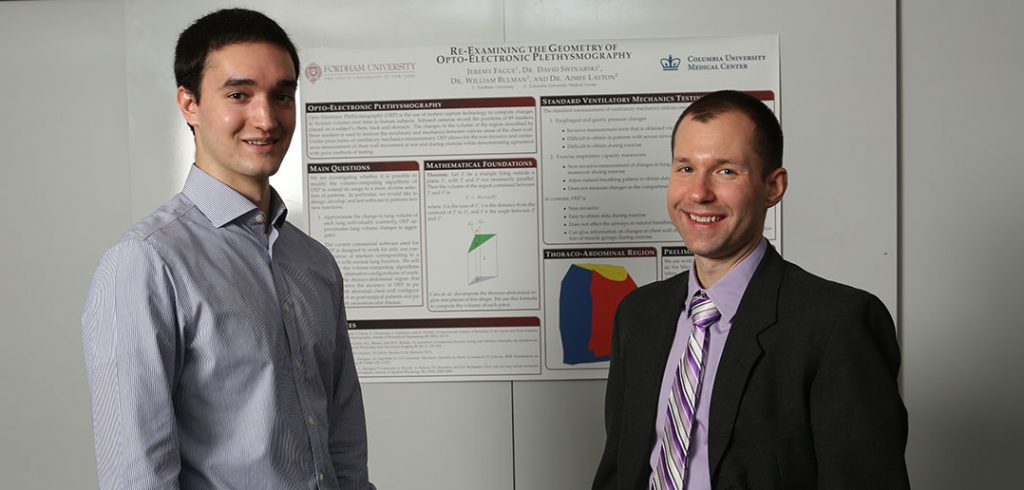Pulmonary researchers all face the same questions, says Fordham math professor David Swinarski, PhD: “Why is this particular patient short of breath?”
Working in Swinarski’s lab, Fordham College at Rose Hill senior Jeremy Fague set out to help find the answer. For almost two years, Fague has been helping Swinarski and a group of Columbia University Medical Center researchers use math and computer programs, like Visual Basic and Excel, to analyze patients who are short of breath.
The researchers place 89 sensors in different patterns on patients’ chests, backs, and stomachs to measure changes in their chest volume while they exercise. They’re hoping this new data will offer better insights compared with data from breathing tests, and will eventually lead to better ways of managing emphysema and other pulmonary issues.
In his work as a research assistant, Fague has been trying to determine what sensor patterns work for different types of people. “The original pattern only works for one body type,” Fague explains. “We want to use this technology to serve a wider population of patients. I’ve spent a lot of time writing a program to try to unlock a lot of this data.”
Fague, a Massachusetts native, started out on the pre-law track at Fordham before realizing he could apply his passion for logic through a double major in math and economics and a minor in computer science. After taking a linear algebra class with Swinarski, he approached him about research opportunities and was invited to join this project.
“I was really attracted to the applied nature of it,” he says. “I’ve always been drawn to how I can use math and technology to directly impact the world around me. Through this work, I can really see how being able to analyze the data differently is going to make a difference in someone’s life.”
Working with Swinarski outside the classroom has been particularly rewarding for Fague. “He challenges me to think on my own and to find solutions,” Fague says. “He gives me a lot of feedback and also works alongside me. He’s everything I hoped I would have in a mentor.”
It’s part of the Jesuit tradition that initially drew Fague to Fordham. “I’ve found that the different perspectives here on campus have always challenged me and made me grow. People here think deeply about fundamental questions.”
Fague’s Fordham experience—his research, his courses, and his work as president of the Alternative Investments Club—landed him a full-time job with Goldman Sachs postgraduation; he also plans to pursue a graduate degree in the near future. Although he is starting a career in finance, he believes this research experience will prove to be invaluable.
“I’m just a mathematician who has really found a lot of different things I can do with math,” he says.

